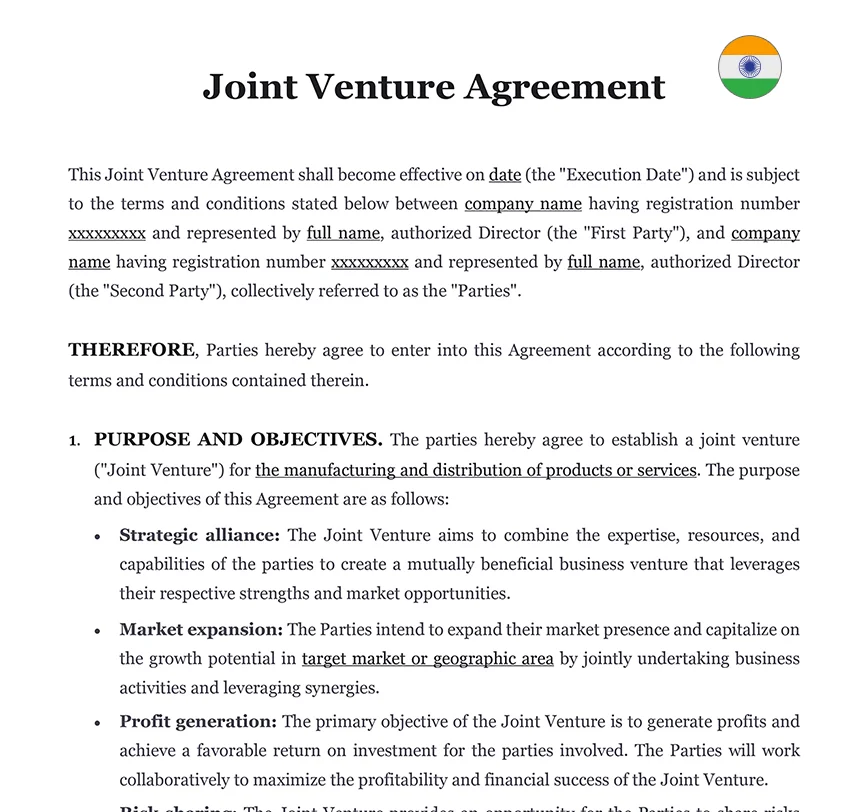
Download this joint venture agreement to outline the terms and conditions of a business arrangement to combine resources and expertise to achieve a specific goal or project.

Word Document (.docx)

Ready to use legal template
Drafted by experienced lawyers
Compliant with Indian law
Ready to use legal template
Drafted by lawyers
Compliant with Indian law
A Joint Venture Agreement is a legal document that establishes the terms and conditions for a business collaboration between two or more independent entities. It outlines the rights, obligations, and responsibilities of the parties involved in the joint venture, as well as the purpose and goals of the collaboration. A joint venture is formed when two or more businesses come together to undertake a specific project or engage in a particular business activity. Unlike a merger or acquisition where one company absorbs another, a joint venture allows separate entities to pool their resources, expertise, and capabilities for a defined period or purpose while maintaining their individual legal identities.
A Joint Venture Agreement (JVA) is a legal document that outlines the terms and conditions under which two or more parties agree to collaborate on a specific business project or venture. The agreement establishes the rights, responsibilities, and contributions of each party involved in the joint venture.
Key elements typically covered in a JVA include the purpose and scope of the joint venture, the capital contributions and resources each party will provide, the distribution of profits and losses, decision-making mechanisms, dispute resolution procedures, and the duration or termination conditions of the joint venture.
The JVA serves as a contract that governs the relationship between the parties, aiming to provide clarity and legal protection for all involved in the collaborative business endeavor.
A comprehensive Joint Venture Agreement (JVA) should include key provisions that define the terms and conditions of the collaboration between the parties involved. While specific details may vary based on the nature of the joint venture and the preferences of the parties, the following elements are commonly included in a JVA:
Identification of Parties: Clearly specify the legal names and details of the parties entering into the joint venture.
Purpose and Scope: Define the objectives, goals, and scope of the joint venture, outlining the specific business activities it aims to undertake.
Contributions: Detail the contributions that each party will make to the joint venture, including financial investments, resources, intellectual property, or other assets.
Ownership Structure: Specify the ownership structure and the percentage of ownership or interest that each party holds in the joint venture.
Management and Decision-Making: Outline the governance structure, decision-making processes, and management responsibilities within the joint venture.
Profits and Losses: Define how profits and losses will be allocated among the parties, including the distribution mechanism and frequency.
Intellectual Property: Address the ownership, usage, and protection of intellectual property developed or utilized during the joint venture.
Confidentiality: Include provisions to protect confidential information, outlining the responsibilities of each party regarding the handling of sensitive business information.
Duration and Termination: Specify the duration of the joint venture and the conditions under which it may be terminated, including any exit mechanisms.
Dispute Resolution: Establish procedures for resolving disputes between the parties, whether through negotiation, mediation, arbitration, or another agreed-upon method.
Regulatory Compliance: Address any legal or regulatory requirements applicable to the joint venture, ensuring compliance with relevant laws and permits.
Non-Compete and Non-Solicitation: Include clauses preventing parties from engaging in competing activities or soliciting employees or customers of the joint venture.
Insurance: Specify any insurance requirements or provisions to mitigate risks associated with the joint venture.
Financial Reporting: Detail the financial reporting requirements and mechanisms for sharing financial information between the parties.
Amendments: Include provisions for amending the agreement, outlining the process for making changes with the mutual consent of the parties.